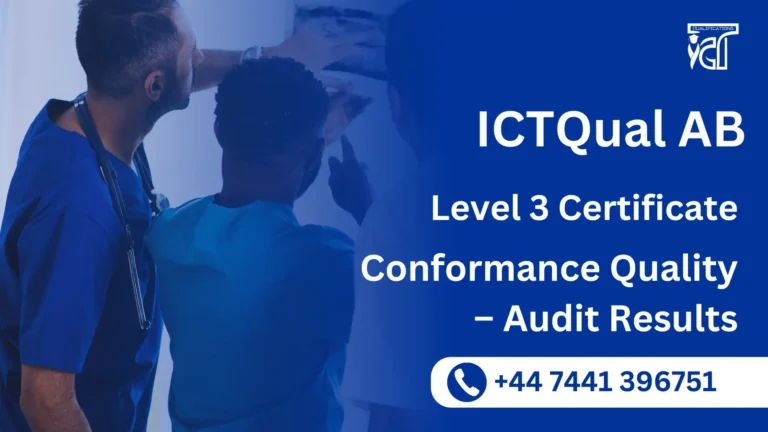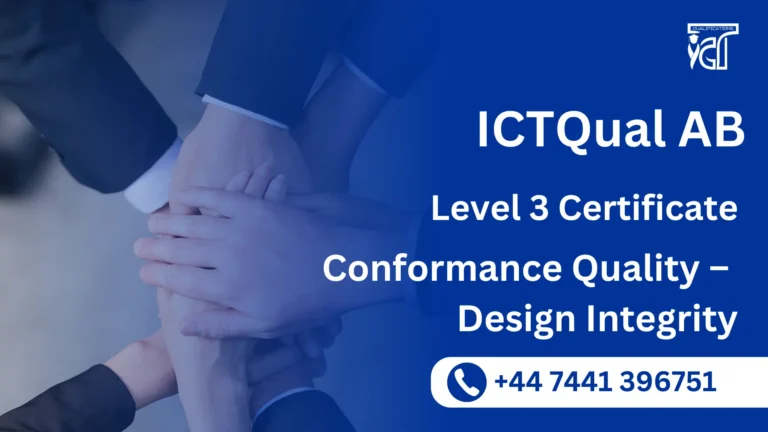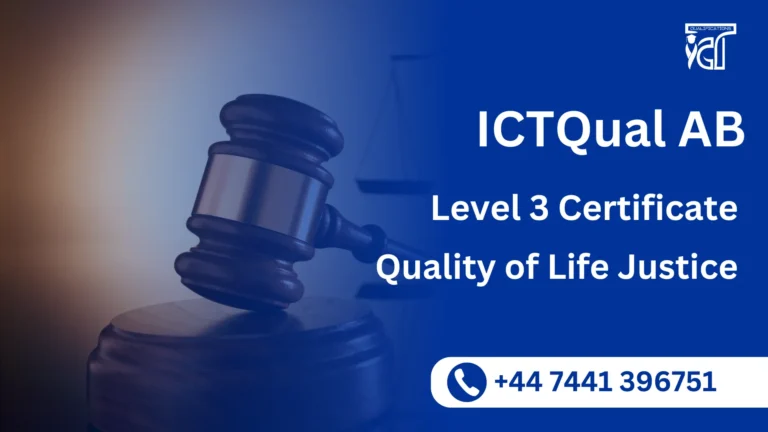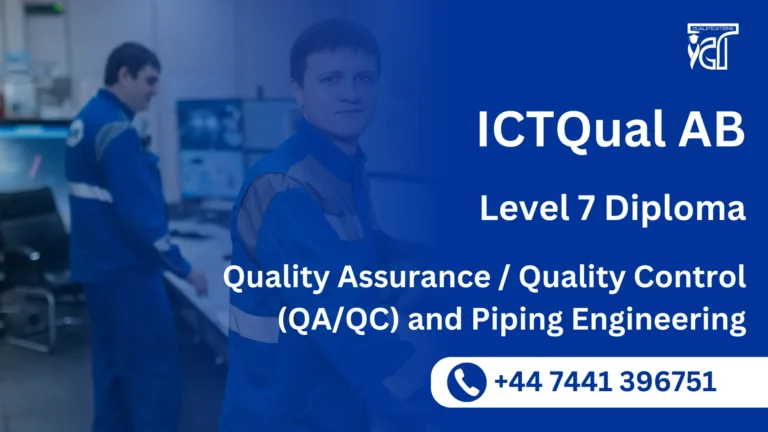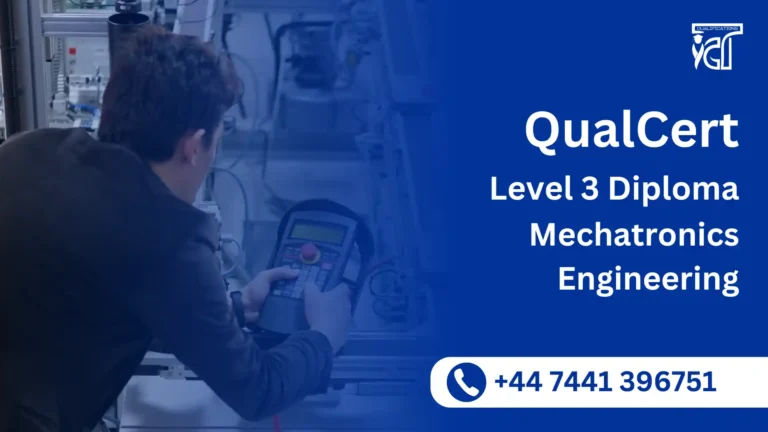In an era where energy efficiency and sustainability are top priorities for businesses and governments alike, professionals with expertise in energy management are in high demand. The ICTQual Level 3 Diploma in Energy Management and Sustainable Practices offers individuals the opportunity to acquire the skills and knowledge needed to thrive in this growing industry. This course equips learners with practical tools for implementing energy-saving solutions, managing resources efficiently, and contributing to the global transition towards more sustainable practices.
Whether you’re aiming to become an energy manager, sustainability consultant, or renewable energy advocate, this diploma is your first step towards making a significant impact in the energy sector.
The ICTQual Level 3 Diploma in Energy Management and Sustainable Practices is a specialized qualification designed for individuals looking to develop foundational expertise in managing energy usage and adopting sustainable practices within organizations. This diploma focuses on enhancing skills in energy auditing, resource management, energy efficiency, and renewable energy solutions. The course aims to prepare learners for careers in the energy sector, enabling them to contribute to a more sustainable future.
This comprehensive course covers a wide range of topics relevant to energy management and sustainable practices. It’s ideal for individuals seeking to understand energy efficiency and the role of renewable energy in modern industries. By providing real-world applications and up-to-date industry knowledge, the diploma ensures learners are equipped to tackle energy challenges in various sectors, including industrial, commercial, and residential.
The ICTQual Level 3 Diploma in Energy Management and Sustainable Practices is the perfect qualification for individuals looking to make a meaningful contribution to energy efficiency and sustainability. It offers practical, real-world knowledge and opens up numerous career opportunities in the growing energy and environmental sectors. If you’re ready to take your career to the next level while making a positive impact on the planet, this diploma is the ideal starting point.
Take the first step towards a sustainable future—enroll in the ICTQual Level 3 Diploma in Energy Management and Sustainable Practices today!
ICTQual Level 3 Diploma in Energy Management and Sustainable Practices
This qualification, the ICTQual Level 3 Diploma in Energy Management and Sustainable Practices, consists of 13 mandatory units.
| Sr# | Unit Title |
|---|---|
| 1 | Fundamentals of Energy Systems and Sustainability |
| 2 | Energy Efficiency Optimization |
| 3 | Energy Auditing Skills |
| 4 | Renewable Energy Integration |
| 5 | Energy Management in Specific Industries |
| 6 | Sustainable Practices and Technologies |
| 7 | Energy Policy and Regulations |
| 8 | Energy Data Analysis and Reporting |
| 9 | Emerging Technologies in Energy Management |
| 10 | Project-Based Learning and Industry Collaboration |
| 11 | Soft Skills for Energy Professionals |
| 12 | Global Case Studies and Best Practices |
| 13 | Capstone Project |
GLH (Guided Learning Hours) and TQT (Total Qualification Time) are terms commonly used in vocational qualifications to help define the amount of time a learner is expected to spend on their studies.
1. GLH (Guided Learning Hours)
GLH refers to the number of hours a learner spends being directly taught, supervised, or supported during their course. This includes the time spent in activities such as:
- Classroom instruction
- Practical workshops
- One-on-one tutoring or mentoring sessions
- Online learning sessions with tutor support
In other words, GLH represents the time that learners are actively engaged with their instructors or learning activities.
2. TQT (Total Qualification Time)
TQT represents the total amount of time a learner is expected to invest in completing a qualification, including:
- GLH (Guided Learning Hours): Time spent on direct learning, as explained above.
- Self-Directed Learning: This includes time spent on independent study, research, assignment completion, preparation for exams, and any other work the learner does outside of direct teaching hours.
TQT is a broader measure that includes all the time required to achieve the qualification. It helps learners and employers understand the overall commitment required for the qualification.
Key Differences Between GLH and TQT:
- GLH focuses on direct learning with guidance or supervision.
- TQT includes GLH as well as independent study time and other learning-related activities.
Example:
If a qualification has a TQT of 600 hours and a GLH of 250 hours, it means the learner should spend 250 hours in direct learning (classroom, online, or tutor-led sessions) and 350 hours on independent study or research.
Here are the learning outcomes for each study unit:
- Fundamentals of Energy Systems and Sustainability
- Understand and analyse the principles of energy systems (thermal, electrical, mechanical) and their applications in industries such as manufacturing, construction, and transportation.
- Evaluate the role and implementation of renewable energy systems (solar, wind, hydro) in global industries.
- Conduct energy flow analysis in real-world industrial processes to identify inefficiencies and propose sustainable solutions.
- Demonstrate hands-on skills in exploring and operating energy systems in practical settings.
- Assess the sustainability of energy systems and their impact on the environment and society.
- Apply knowledge of energy systems to solve real-world problems in industries.
- Energy Efficiency Optimization
- Conduct energy audits in manufacturing plants, commercial buildings, and hospitality sectors.
- Identify energy waste in HVAC systems, lighting, and machinery.
- Implement energy-saving measures in industries like automotive, textiles, and food processing.
- Use energy monitoring tools and software (e.g., IoT-based energy meters).
- Energy Auditing Skills
- Conduct a step-by-step energy audit in real world settings (e.g., office buildings, factories, hospitals).
- Collect and analyse data using energy audit tools (e.g., thermal imaging, power analysers).
- Benchmark energy performance across industries (e.g., comparing energy use in steel vs. cement industries).
- Develop actionable energy audit reports for stakeholders.
- Renewable Energy Integration
- Design and install solar PV systems for residential, commercial, and industrial use.
- Maintain and optimize wind turbines in wind farms.
- Apply bioenergy solutions in agriculture and waste management industries.
- Analyse hydro power systems in water-intensive industries.
- Integrate renewable energy systems into existing energy infrastructure.
- Evaluate the economic and environmental impact of renewable energy systems.
- Energy Management in Specific Industries
- Analyse energy management strategies in manufacturing industries.
- Design energy-efficient solutions for the construction industry.
- Implement fuel reduction strategies in transportation and logistics.
- Manage energy use in healthcare facilities effectively.
- Apply energy-efficient practices in agriculture.
- Develop cross-industry energy management strategies.
- Sustainable Practices and Technologies
- Understand and apply waste-to-energy systems in municipal and industrial waste management.
- Develop and implement carbon footprint reduction strategies in supply chains.
- Apply practical solutions to address the water-energy nexus in industries like textiles and food processing.
- Implement circular economy practices in manufacturing and retail.
- Evaluate the role of sustainable technologies in achieving global sustainability goals.
- Demonstrate critical thinking and problem solving skills in sustainable practices.
- Energy Policy and Regulations
- Understand and apply energy regulations in different countries (e.g., EU energy directives, US EPA standards).
- Ensure compliance with ISO 50001 (Energy Management Systems) in various industries.
- Develop energy policies for small and medium enterprises (SMEs).
- Energy Data Analysis and Reporting
- Use energy management software for data analysis
- Create dashboards to visualize energy consumption trends
- Report energy performance to stakeholder in various industries
- Analyse energy data to support decision making
- Apply energy data analysis to industry specific challenges
- Emerging Technologies in Energy Management
- Understand and explain smart grid technologies and their applications in urban and rural areas.
- Evaluate the role of energy storage systems in renewable energy integration.
- Apply AI and machine learning for predictive energy maintenance in industries.
- Analyse the use of blockchain technology for energy trading in decentralized systems.
- Synthesize knowledge of emerging technologies to propose innovative solutions for energy management.
- Project-Based Learning and Industry Collaboration
- Demonstrate the ability to apply theoretical knowledge to real-world energy management projects.
- Evaluate the operational and environmental impact of energy systems in industrial settings.
- Develop and implement simulated energy management scenarios for diverse industries.
- Collaborate effectively with industry partners to address energy and sustainability challenges.
- Analyse and interpret data from site visits to energy-related facilities.
- Propose sustainable energy solutions aligned with industry needs and global sustainability goals.
- Soft Skills for Energy Professionals
- Communicate energy-saving strategies effectively to non-technical stakeholders.
- Collaborate effectively in cross-functional teams on energy projects.
- Apply problem-solving skills to address energy crisis scenarios (e.g., power outages, fuel shortages).
- Demonstrate leadership and interpersonal skills in energy-related projects.
- Apply critical thinking to analyse and improve energy efficiency strategies.
- Build and maintain professional relationships with stakeholders in the energy sector.
- Global Case Studies and Best Practices
- Analyse successful energy management case studies from global industries.
- Identify lessons from failed energy projects and strategies to avoid common pitfalls.
- Adapt global best practices in energy management to local industry contexts.
- Demonstrate critical thinking in evaluating the applicability of global energy solutions.
- Capstone Project
- Design an Energy Management Plan for a Specific Industry
- Implement an Energy Management Plan
- Present Findings and Recommendations to Industry Experts
- Evaluate the Economic Impact of Proposed Solutions
- Evaluate the Environmental Impact of Proposed Solutions
- Reflect on the Project and Identify Areas for Improvement
Benefits of the ICTQual Level 3 Diploma in Energy Management and Sustainable Practices
The ICTQual Level 3 Diploma in Energy Management and Sustainable Practices offers a variety of key benefits that can significantly enhance your career prospects while making a positive impact on the environment. Here’s a look at the most important advantages of this qualification:
1. Enhanced Career Opportunities
- High Demand for Skilled Professionals: As industries across the globe seek ways to reduce energy consumption and promote sustainability, the demand for trained energy managers and sustainability experts continues to rise. This diploma ensures you are equipped with the relevant skills to meet this growing demand, opening doors to career roles such as Energy Manager, Sustainability Consultant, and Environmental Auditor.
2. Practical Knowledge and Skills
- Hands-on Learning: The course equips you with practical tools for conducting energy audits, implementing energy-saving strategies, and using renewable energy solutions. These skills are immediately applicable in real-world scenarios, ensuring you can make a tangible impact in the workplace.
3. Contributing to Sustainability
- Positive Environmental Impact: By understanding and applying sustainable practices, you’ll play a key role in helping organizations reduce their carbon footprint, manage resources more efficiently, and contribute to global sustainability efforts. This course is an excellent way to support your personal commitment to environmental protection while advancing your career.
4. Industry Recognition
- Ofqual Regulated Qualification: The diploma is Ofqual regulated, ensuring that it meets the highest standards of education and is recognized by employers and institutions worldwide. This adds credibility to your professional qualifications and enhances your career prospects both locally and internationally.
5. Career Progression
- Pathways to Advanced Roles: Upon completion of the diploma, you can pursue higher-level qualifications in energy management, renewable energy, or environmental sustainability. This course provides a solid foundation for further studies, allowing you to specialize in specific areas of energy management or transition into leadership roles within the sector.
6. Focus on Future-Proof Skills
- Sustainable Practices for Tomorrow’s Economy: With the world moving towards a more sustainable future, organizations are increasingly prioritizing energy efficiency and renewable energy adoption. The knowledge you gain from this diploma will keep you at the forefront of sustainable energy practices, positioning you as a valuable asset in a future-focused job market.
7. Flexible and Accessible Learning
- Adaptable Study Options: The course is designed to be flexible, making it suitable for working professionals who want to advance their careers without disrupting their current job. Many programs offer online learning options, allowing you to balance your studies with your professional and personal commitments.
8. Support in the Workplace
- Improve Organizational Performance: As an Energy Manager or Sustainability Consultant, the skills learned from this course will help you guide organizations in optimizing energy usage, reducing costs, and increasing efficiency. These improvements can lead to greater profitability and a more competitive edge in the marketplace.
9. Networking Opportunities
- Join a Community of Energy Experts: During the course, you’ll gain access to a network of professionals in the energy and sustainability sectors. These connections can be valuable for career growth, offering opportunities to share knowledge, collaborate, and potentially explore job opportunities within the field.
10. Cost-Efficient Investment
- Long-Term Financial Savings: By learning to identify and implement energy-efficient solutions, you can help organizations significantly reduce their energy costs. These savings can be reinvested in the business, leading to improved profitability while making your role more valuable to employers.
Best Fit for the ICTQual Level 3 Diploma in Energy Management and Sustainable Practices
The ICTQual Level 3 Diploma in Energy Management and Sustainable Practices is ideal for individuals seeking to enhance their careers in energy management, sustainability, and environmental practices. Here’s the best fit for this course:
1. Professionals Looking to Transition into Energy and Sustainability Roles
- Career Changers: If you are currently working in a different industry but want to transition into the growing field of energy management or sustainability, this course offers a comprehensive foundation to make that shift. Whether you come from a background in engineering, business, or operations, the diploma will equip you with the necessary skills and knowledge for success in a new career path.
2. Energy Managers or Sustainability Consultants
- Existing Professionals: If you are already working in a role related to energy management or sustainability but wish to formalize your expertise and enhance your qualifications, this diploma is perfect for you. It allows you to deepen your understanding of energy audits, energy-saving strategies, and sustainable practices, giving you the tools to advance in your career and take on leadership roles within your organization.
3. Environmental Enthusiasts and Sustainability Advocates
- Individuals Passionate About the Environment: If you have a personal commitment to reducing energy consumption and promoting sustainability, this course provides the technical knowledge and practical skills necessary to apply your passion in a professional setting. It helps you make a real difference in organizations by leading energy-efficient projects and creating sustainable solutions.
4. Graduates in Related Fields
- New Graduates: Recent graduates with degrees in fields such as environmental science, engineering, or business who want to specialize in energy management or sustainable practices will find this diploma a valuable qualification. It complements their academic knowledge with practical, industry-recognized credentials, helping them stand out in the competitive job market.
5. Individuals Looking for Career Progression
- Career Advancers: If you are already employed within an organization and are looking to move into higher management or specialized roles within the energy or sustainability sector, this diploma will help you gain the skills necessary to step up. It prepares you for roles such as Energy Manager, Sustainability Officer, or Environmental Consultant, offering opportunities for career growth.
6. Businesses Seeking Employee Development
- Employers Investing in Their Team: Organizations looking to enhance their team’s knowledge and capabilities in energy management and sustainable practices can benefit from enrolling their employees in this course. It enables employees to implement energy-efficient practices within the company, leading to cost reductions and improved sustainability initiatives.
7. Those Seeking Flexibility in Learning
- Self-Driven Learners: If you are a self-motivated individual who is looking for flexibility in terms of study hours and learning modes, this course suits you. With flexible study options, including online learning, it allows you to balance your educational journey with personal and professional commitments.
Entry Requirements
Register Now
Qualification Process
Qualification Process for the ICTQual Level 3 Diploma in Energy Management and Sustainable Practices
Certification:
Upon successful completion of all checks, ICTQUAL AB will issue your official certificate, confirming that you have attained the ICTQual Level 3 Diploma in Energy Management and Sustainable Practices.
Self-Assessment:
Begin by evaluating your eligibility to ensure you meet the qualification requirements, including work experience, knowledge, and language proficiency.
Registration:
Complete your registration by submitting the required documents, including a scanned copy of a valid ID, and paying the registration fee.
Induction:
An assessor will conduct an induction to confirm your eligibility for the course and explain the evidence requirements. If you do not meet the criteria, your registration will be canceled, and the fee will be refunded.
Assignmnets & Evidence Submission:
Provide all assignmnets and the necessary evidence based on the assessment criteria outlined in the course. If you are unsure of the required evidence, consult with the assessor for guidance on the type and nature of evidence needed.
Feedback and Revision:
The assessor will review your submitted evidence and provide feedback. Evidence that meets the criteria will be marked as “Criteria Met,” while any gaps will be identified. You will be asked to revise and resubmit if needed.
Competence Evidence:
Submit final evidence demonstrating that all learning outcomes have been met. This evidence will be marked as “Criteria Met” by the assessor once it is satisfactory.
Internal Quality Assurance (IQA):
The Internal Quality Assurance Verifier (IQA) will review your evidence to ensure consistency, quality, and compliance with standards.
External Verification:
The IQA will submit your portfolio to ICTQUAL AB External Quality Assurance Verifiers (EQA) for final confirmation. The EQA may contact you directly to verify the authenticity of your evidence.



